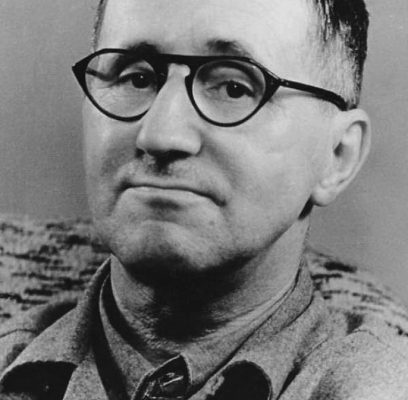 In 1976, at the beginning of my Junior year of college, I was working at a little desk in the basement of the music department, handing out keys to the practice rooms. A professor of mine, John Swackhamer, came by and plonked a 3-inch high stack of xeroxed music in front of me. He had a glint in his eye (he almost always did), and he explained how this score had been smuggled out of East Germany by a fellow professor. It was the piano/vocal music to the Hans Eisler/Bertolt Brecht play “The Measures Taken”. He asked if I had any experience in music theatre. “Um… I was a dancer in my high school production of the Music Man…And I sang the little Nazi’s song in Cabaret…” Not a stunning resume. But to him it was as if I’d just said I was Harold Prince. “Excellent! There’s a director who’s putting on this play, and you’d be perfect as the music director! Call him!”
In 1976, at the beginning of my Junior year of college, I was working at a little desk in the basement of the music department, handing out keys to the practice rooms. A professor of mine, John Swackhamer, came by and plonked a 3-inch high stack of xeroxed music in front of me. He had a glint in his eye (he almost always did), and he explained how this score had been smuggled out of East Germany by a fellow professor. It was the piano/vocal music to the Hans Eisler/Bertolt Brecht play “The Measures Taken”. He asked if I had any experience in music theatre. “Um… I was a dancer in my high school production of the Music Man…And I sang the little Nazi’s song in Cabaret…” Not a stunning resume. But to him it was as if I’d just said I was Harold Prince. “Excellent! There’s a director who’s putting on this play, and you’d be perfect as the music director! Call him!”
I called the director, who likewise seemed to have no problem with my lack of experience. So I gathered together a ragtag yet spirited band who taught me how to write for their respective instruments, and a choir of 12 or so. I really had no idea what I was doing. But the play was a huge hit. Shortly after, RG Davis, founder of the San Francisco Mime Troupe, opened a new theatre company, Epic West, the Centre for the Study of Bertolt Brecht. He asked me to be the music director. Big names from East Germany came to collaborate and teach, the productions had lots of great Bay Area actors in the casts, and while I was excited to be in the middle of it, my understanding of it all was pretty limited. (It was amusing to have my parents, longtime conservatives, come to the productions which were noisily marxist and densely intellectual. My parents were wonderfully supportive – My mother found and gave me a rare LP of Lotte Lenya singing)
I began to get work with other theatre companies, but my reputation as a Brechtian expert had been solidified, and I kept getting approached to do Brecht and political theatre. Ina Wittich, a famous (in East Germany) East German interpreter of Brechtian songs, came to California for a tour and needed an accompanist. Eisler songs are technically easy, almost like rock or folk music. Ina croaked them in a Lotte Lenya kind of way. But, for her big concert at Mandeville Hall in UC San Diego, she wanted me to play Eisler’s Sonata for Piano. I’m not a fast learner, and his sonata is technically difficult, atonal, and huge. And I only had 10 days to master it. I begged her to let me off the hook, but, and perhaps this was the East German in her, she would not change her mind. Onstage that night, in front of 1,000 or so people, I flailed my way through it, just making up whole sections of atonality when the notes on the page blurred before my eyes. Afterwards, at the wine & cheese function, a UC music professor buttonholed me. He wanted to talk to me about my playing of Eisler’s Sonata. The cheese in my mouth went dry. He said “That was the most brilliant interpretation I’ve heard. It sounded so fresh, so new!” Well, yeah, half that music had never been played before, by me or anyone else.
Is there Brecht/Eisler/Weill in the music I write? I don’t claim them as major influences, but years of study and immersion must have left some traces. My predilection for simplicity and directness is something I tend to attribute to my rock and roll roots, but it’s a strong element in both Eisler’s and Weill’s music, and in Brecht’s lyrics and drama. Maybe it’s a combo of both Marx and Lennon – Yar yar yar.

